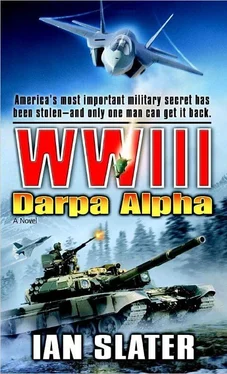Everyone on the team — Choir, Johnny Lee, and Freeman on the eastern side of the road, Tony Ruth, Gomez, and Murphy on the western side — saw Prince stop short, pine cones flying in front of his paws. The weight of his armored vest was starting to tell, his panting more rapid than it had been when they left the helo, but the rest of him was rigid. He was pointing. They froze. Freeman knelt on the soft earth and fallen leaves on the road’s shoulder, and Tony Ruth could see the general’s gloved right hand switch his AK-74 from the “off” position. Everybody else had done the same.
The disquieting noise of their controlled breathing could be heard above the stillness of the forest from which a white mist bled. Prince was pointing into the woods from the road at a barely discernible opening in the wall of trees and brush only a few yards from the road’s shoulder. Had the terrorists’ rear guard anticipated his move, wondered Freeman, and also raced through the woods from the lakeside to reach the road? Both sections of Freeman’s team had automatically adopted CAF, covering arcs of fire, so that they could engage the enemy and guard each other.
He saw the silhouette of an AK-47’s front sight above the trail and fired. Both of his sections opened up, using the falling corpse, a U.S. Army uniform, as their central aiming point. The air was ripped apart by the sudden fury of the firefight, but it was all one-way, the enfilade from Freemen’s men having the crucial advantage. Anyone behind the first man they’d killed would be unable to get past him easily on the narrow trail and forced to ground amid timber and brush that was now the recipient of concentrated fire, 7.62 mm and 5.56 mm rounds pouring into the woods in a narrow cone. If the screams and Arabic curses of the dying were anything to go by, all six of the terrorists were either down, dead, or badly wounded, Prince growling ferociously at the mere gall of the interlopers.
“Johnny, Tony, Choir!” Freeman shouted. “Come with me.” He then told Eddie Mervyn and Gomez to “clean up then catch up,” as he and the other three, with Prince leading, continued their forced march north on the deserted road. Freeman, on point as usual, spotted a faint gleam of metal in the woods off to his left. It was a downpipe from a creeper-covered cabin set well back, about a hundred feet, in the forest. The general led his men in through shoulder-high salal that formed the perimeter of a small clearing, mist enveloping the surrounding timber like malevolent layers of swamp gas. A thin, lazy plume of smoke issued from the cabin’s stone chimney. A beat-up Ford Explorer, its left rear fender badly rusted and strips of duct tape holding in a rectangle of transparent plastic that had replaced the back window, stood forlornly a few yards from the rear of the cabin, its tires’ tracks disappearing into the overcast green of salal.
Freeman extracted one of DARPA’s “products”—or “goodies,” as the Special Forces called them. It was a matchbox-size scanner-remote-key that, upon activation with one push of a man’s thumb, scans for the solenoid opening frequency of a vehicle and unlocks it. A more civil approach, knocking on the cabin door, explaining the dire need for the vehicle to catch up with the terrorists, to overtake them, had occurred to the general, but the very thought of the disk being in enemy hands was chilling enough, the possibility of Americans being attacked by such weapons evicting any idea of social niceties.
A woman inside the cabin was screaming and a man in a tie-dyed nightshirt came running out with a baseball bat.
“Stop!” yelled Freeman. “U.S. Army Special Forces. We need your vehicle. We’ll pay you compensation. Give me the keys.”
“What the—”
“The keys! Quickly!”
The man, dropping the bat, ran back into the dimly lit cabin, followed by Freeman. The general watched him go past a potbellied stove to a small table by a creeper-covered window. “Here!” He tossed the SUV’s keys to Freeman.
“Thank you, sir,” said Freeman as they came out. “Stay inside. Bad day to be out.”
“You’re as bad as the guys you’re after!”
Freeman lobbed the keys to Choir, and glanced back at the man. “What other guys?”
“Guys who done the same as you to Mick Sutter.”
“When?
The man’s sense of outrage was increasing. “’Bout twenty minutes ago. Busted into his shed, stole his car. Tried to call the cops but they’d cut his line. Smashed his cell too. Just charged in like you guys.”
“If his phones were taken out, how come you know about it?”
“He walked down the road a ways to a neighbor’s. He called us.”
“You have any description?” Freeman asked him, adding, “We’re on your side.”
“Huh,” said the man derisively. “Funny way of showin’ it.” But Freeman could tell the man believed him. “They was dressed like you guys. Battle gear. Dark eyes, Mick’s wife said. Middle Eastern guys. Like A-rabs. They looked wet — like they’d been out on the lake.”
“What kind of car did they take?” asked the general.
“Gray — old Dodge Colt.”
“License?”
“Canadian. Sutters are Canadian — stay all summer and fall. Thelma,” he called back to the woman in the cabin, “you got that license plate number Mick gave you?”
“It’s RCV—” said the woman, timidly emerging from the cabin with a piece of paper, her hands shaking, pulling jerkily at her bath robe. “—RCV 625.”
Choir backed the Explorer out quickly, throwing gravel. Freeman made contact with Sal and Aussie via their headsets. “You still have a beep?”
“Affirmative. It’s coming from what’s indicated on the Tac Nav chart as a campground, a new one — Melson Campground — near the top of the lake. Possible they’re changing into civilian—” There was the crackle of static, and then Aussie and Sal could hear Freeman telling them that now that the rearguard action was over they should wait at the helo until further notice. The general had no sooner finished talking with Aussie and Sal than he heard Eddie Mervyn coming in on his MIR line informing him that, as suspected, all the rearguard terrorists — six of them — were dead. Freeman thanked Eddie and Gomez, telling them that he, Ruth, Choir, and Johnny Lee were only a quarter mile up the road, they had an SUV, and would pick them up within a few minutes.
After Mervyn and Gomez were in the SUV, the team headed north on the lone road. The Ford Explorer was doing a maximum of thirty miles per hour, Ruth on the passenger-side running board, the general on the driver’s-side running board, both looking ahead for any sign of an improvised booby trap. The Explorer’s defroster was on the fritz, so Choir had to use his free hand to wipe the condensation from the windshield. Thirty miles per hour on the straightaway was Choir’s compromise between getting there quickly but still having time to jam on the brakes, should anything suspicious appear on the road that was now funneling into a dark tunnel of trees.
Freeman figured Choir’s speed was a bit overcautious, but one anti-personnel mine on the road could rupture a tire and bring everything to a screeching halt.
There was no mine, but an all-but-invisible cable strung tautly across the road.
“Brake!” yelled Ruth, Choir shouting, “Heads down!” Choir’s controlled skid saved the Explorer from taking the impact full-on, its right side slamming against the cable. Ruth, caught by the cable, was lifted up by it, his helmet flying off, his severed head rolling along the road’s shoulder in a flurry of dead leaves, his torso gushing blood. The nose-clogging smell of burnt rubber wafted over the others as the SUV stopped, everyone in utter shock, their obscenities rending the air. Recovering first, Douglas Freeman said, “God watch him,” then “Put him in the back! MOVE! ” As they did so, the pungent odor of burnt rubber hung about the vehicle like a funeral pall.
Читать дальше












